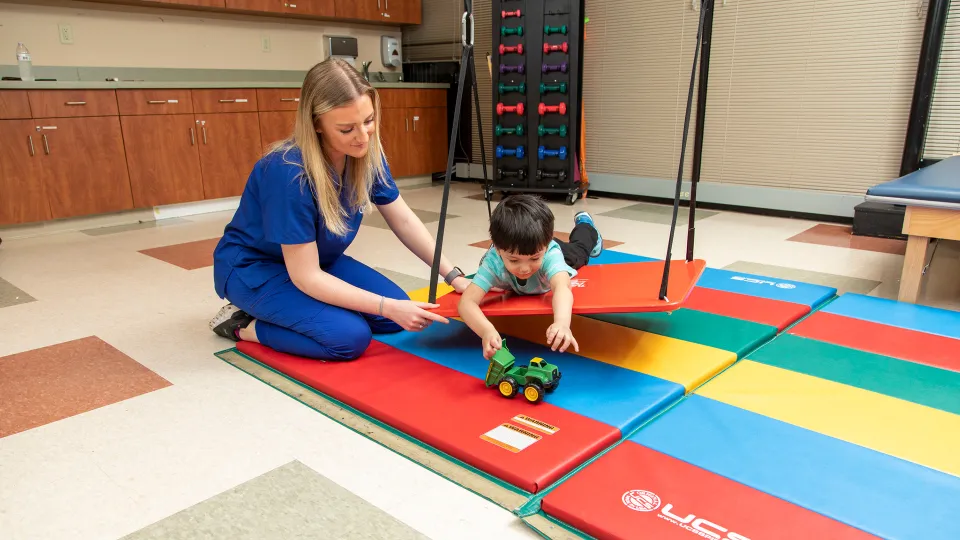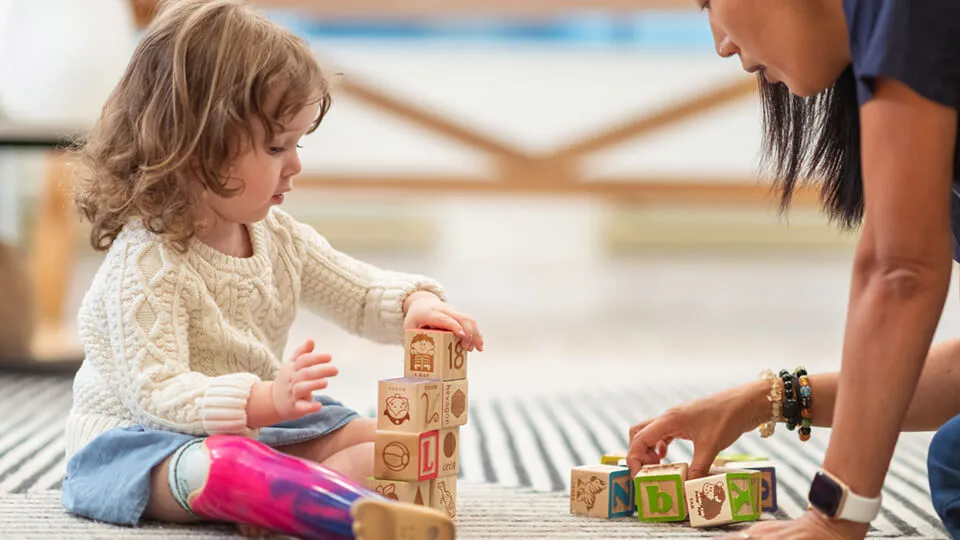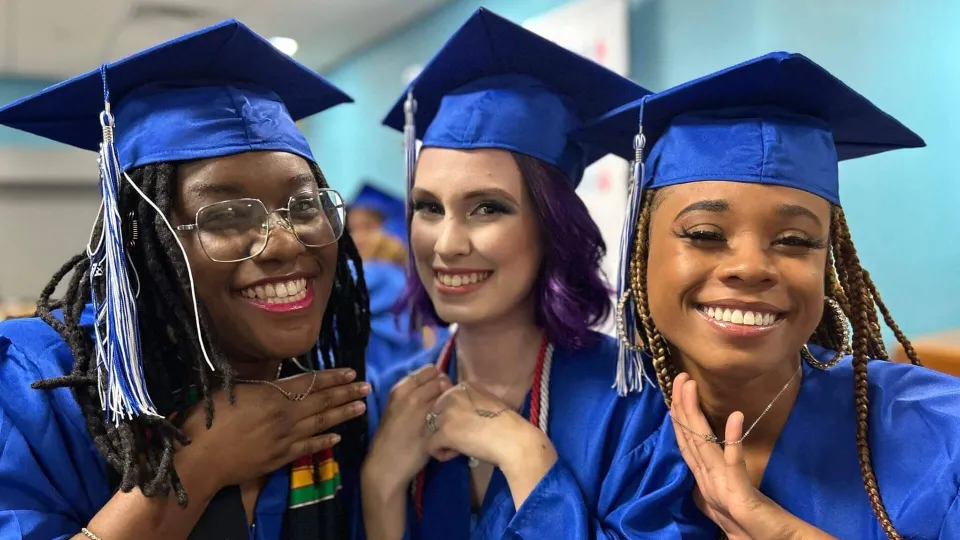
From Medical Assistant to Occupational Therapy Assistant: A Journey of Passion and Dedication
A graduate of Concorde's Occupational Therapy Assistant program at Miramar, Amy's journey from a Medical Assistant to an Occupational Therapy Assistant (OTA) is a powerful success story.
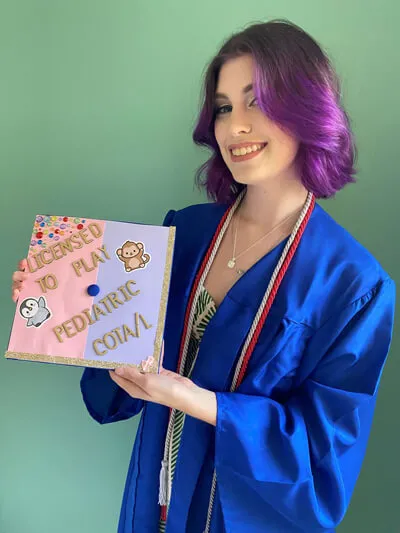
Embracing a New Career Path
Amy's career in healthcare began in dermatology, where she worked as a Medical Assistant for almost two years. This experience helped her realize she wanted to do more with patients.
"I originally thought I wanted to become a Nurse, but after researching different healthcare roles, I realized that Occupational Therapy was my true calling," Amy shares.
"Occupational Therapy is a fulfilling career for me because I can work with patients on a personal level. I love the challenge of using my curiosity to learn about a patient's situation. This knowledge guides me in providing one-on-one treatment to improve their health," Amy explains.
Amy's Advice for Healthcare Career Seekers

Amy shared, "Research guided me to the right healthcare career fit. From watching online videos to going to open houses, I studied different healthcare careers and found Occupational Therapy.”
Amy shares advice for those thinking about a healthcare career, "Do extensive research in every way possible. Question the difference between healthcare jobs and look for answers," she says. "Go on YouTube, talk to people you might know or even call a school to ask questions," she adds.
"After researching the field, my interest in OTA took off," Amy recalls. A campus tour at Concorde’s Miramar campus was a key moment for her. "They showed me around, including the clerical offices, financial aid, and Dean’s office, making me feel like I was already a student," she describes. The tour, especially the OTA lab full of impressive equipment, confirmed her path. "Seeing where I would have hands-on learning made me see myself sitting in the classroom, in that lab, learning."
Amy also mentioned the importance of flexible class schedules. "I started with night classes. However, I learned how I could do some of my classes online," she explains.
Overcoming doubts and tough situations is part of the journey. Amy shared, "Sometimes we stop ourselves because we think we have too many other things to take care of, like kids or bills.” Yet Amy was determined, "I took night classes, and they were difficult, but I did it. I learned that you just have to take a leap of faith when you're determined to start a new career."
Amy's story shows how research, acting on your own and not giving up can help anyone wanting to start a new job in healthcare.
Key Traits of an Occupational Therapy Assistant
Amy talks about the important personality traits you need for a job in Occupational Therapy. She says, "Above all, having curiosity and compassion, and being a people person are important in OT.”
Amy adds, "Being curious helps you figure out what's going on with a patient by looking into their symptoms carefully and finding out more. If you're good with people skills, patients will feel like you really get them and care about them. Most importantly, being kind is important because it means you can feel for your patients and be patient with them as you help them get better from injuries or other health problems."
Learning the Ropes: Amy's Fieldwork Experience
In December 2020, Amy began the OTA program, and she and her husband, who'd been married for a year, moved in with family. Then, the COVID-19 pandemic began to unfold. This started a busy and stressful chapter for Amy. Her OT fieldwork was key to her learning during this challenging time.
Connecting Classroom Lessons to Real-World Skills
Her fieldwork experience, which included Hippotherapy, gave her the chance to use what she learned in class. "In OT, Hippotherapy is the use of horses in therapy. It helps improve motor function, balance, sensory awareness and mental health," Amy explained.
Even though her fieldwork was tough, involving eight weeks of practicing hippotherapy with children, Amy had more on her plate. She was balancing student life with the personal milestone of her and husband buying their first home. "This period was really rewarding but incredibly challenging," she shared.
Amy found support and encouragement in Ms. LaKeisha Sanders-Woods, Academic Fieldwork Coordinator at the Concorde Miramar campus. "Ms. Woods was so motivating, sweet and a true support," Amy fondly remembered. Her mentor's words, "Now you can do it. Come on, don't let these little things get in your way. You're almost there," helped Amy get through the hardest parts of her fieldwork.
A Supportive Learning Community
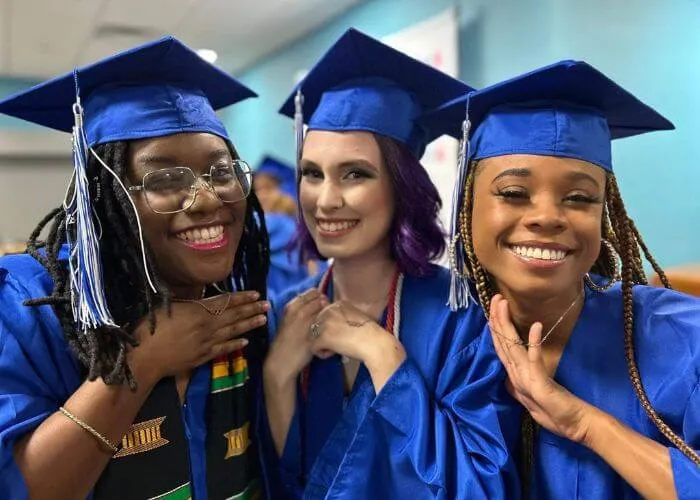
Amy Marks talks about the big moments that helped her succeed. Once, a partner in a project left, and Amy was worried about finishing the work by herself. But then, two other students, Angelica and Camille, invited her to join their team. They became good friends and still are today.
Amy says, "Joining my project partners, Angelica and Camille, was special. Their encouragement and support helped us keep going when we had to study late at night and on big test days."
Amy talks about how important friends were at Concorde. "Our small group felt like a close family," she says. "We helped and cheered for each other, giving advice and encouragement when needed. Working together really helped us learn."
Looking back, Amy says she got through tough times because of her friends' support and teamwork. "Having buddies to help was key," she notes. "Making those connections and forming friendships made learning better and gave us friendships that last."
From Classroom to an OTA Career
Being an Occupational Therapy Assistant means you can work in lots of different places. You might work in hospitals, schools, rehab centers, or even at someone's home. There are so many choices, and you get to help all kinds of people.
Amy wanted to make a difference, learn new things, face challenges, and try things outside of her usual comfort zone.
She started working at Holy Cross where patients recover after a hospital stay. Amy talked about one patient who's had a lasting impression.
Making a Difference, One Patient at a Time
Being an OTA is special for Amy because of her close connections with her patients. She says it's all about getting to know them, learning about their lives, who they are and their challenges.
She talked about a client who hurt his leg badly when he fell in a parking lot. Getting better was tough for him, especially because he was scared of falling again and was in a lot of pain. Every therapy session was hard, but they were needed to start walking properly again.
Amy admired his bravery. She would cheer him on daily as he tried walking, showing him support. She could see how hard he tried, even though it was tough.
After his therapy, Amy would always visit him and see if she could help make him feel better. "We discussed OT, his healing process, and everything in between," Amy shared. This helped them become close friends.
When it was time for him to go home, he told Amy, "I couldn't have done this without you." His tone was so genuine; it was so moving to hear it," she said. It showed her how important it is to support and connect with people during tough times.
Amy learned a lot from trying different OT roles but loves working with kids the most. "Seeing kids get better and happier is the best part of her job," Amy says. She loves investigating what each kid needs and how to help them.
A Foundation for Success at Concorde
Concorde set Amy up for success as an OTA. She says, "Concorde was the start of everything, giving me the know-how I needed for Occupational Therapy. The program was all about hands-on learning, and the instructors were super supportive, helping me grow into the professional I am today."
Amy's husband, Devin, also witnessed her growth through the program. "When Amy first talked about wanting to be an Occupational Therapy practitioner, I had no idea what Occupational Therapy was. I learned through Amy's schooling at Concorde just how much of an impact OTA has on people's lives," he says.
Devin added, "Learning about the incredible benefits of OTA and hearing about the patients who are so grateful for everything that Amy does for them gives me real appreciation for what Amy does. Amy's ability to look at the world through an occupational lens has given her the ability to help so many people."
Looking Ahead: Continuing to Impact Lives

Amy is excited about her future and loves working as an OTA.
"My time at Concorde taught me to see the good in everyone. Being an OTA has strengthened my compassion for others," she shares. She wants OTA students to keep going, even when it gets tough. "Everything feels so much heavier and more difficult when you're in school. Just hang on. You're almost there," she encourages.
Take The Next Step Towards a Brighter Future
Interested in learning more about our Occupational Therapy Assistant program?
We have a Concorde representative ready to talk about what matters most to you. Get answers about start dates, curriculum, financial aid, scholarships and more!

